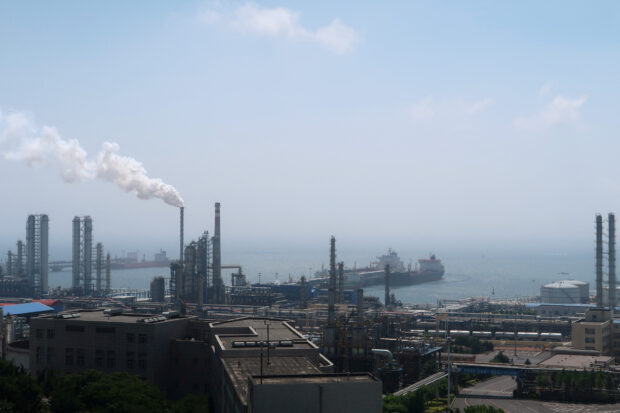
China National Petroleum Corp (CNPC)’s Dalian Petrochemical Corp refinery is seen near the downtown of Dalian in Liaoning province, China. REUTERS/Chen Aizhu/File photo
LONDON -Oil prices stabilized on Wednesday as investors weighed worries about China’s embattled economy against tighter supply in the United States.
Brent crude futures edged up 20 cents to $85.09 a barrel by 0831 GMT, while U.S. West Texas Intermediate crude (WTI) crept 18 cents higher to $81.17 a barrel.
Both benchmarks fell more than 1 percent in the previous session to their lowest since Aug. 8.
China’s sluggish economy is in focus, after retail sales, industrial output and investment figures failed to match expectations, fueling concern over a deeper, longer-lasting slowdown in growth.
This July activity data has prompted concerns that China may struggle to meet its growth target of about 5 percent for the year without more fiscal stimulus.
China’s central bank made a marginal cut to interest rates after data that highlighted intensifying pressure on the economy, mainly from the property sector, though analysts say the cut was too small to make a meaningful difference.
Both the OPEC+ group, comprising the Organization of the Petroleum Exporting Countries and allies, and the International Energy Agency (IEA) are banking on China – the world’s biggest oil importer – to galvanize crude demand over the rest of 2023.
Chinese woes and skepticism is growing and the focus is on whether the beating heart of global and oil demand growth will stage a convincing recovery any time soon, PVM analyst Tamas Varga said.
Meanwhile, U.S. crude stocks dropped by about 6.2 million barrels last week, according to market sources citing American Petroleum Institute figures. That was a much bigger draw than the 2.3 million drop analysts polled by Reuters expected.
U.S. government data on inventories is due later on Wednesday.
The outlook in the fourth quarter will “depend on the macroeconomic situation in China primarily, albeit it looks like Saudi will continue to address that via their cuts, if needed”, said Rystad Energy’s research director Claudio Galimberti.
Supply cuts by Saudi Arabia and Russia have pushed up oil prices over the past seven weeks.